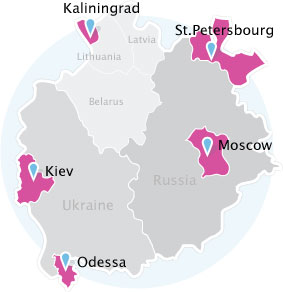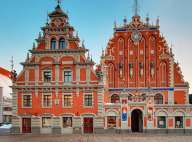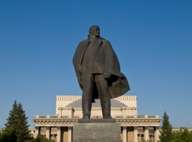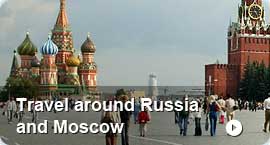Russian Cyrillic alphabet
Additional features of Russian pronunciation
The Cyrillic alphabet is closely based on the Greek alphabet, with about a dozen additional letters invented to represent Slavic sounds (read or short history of the Russian language). There are very few pronunciation rules in Russian, words are pronounced the way they are spelled and vice versa. An overview of the the pronunciation of all letters of the Russian alphabet is provided below:
English/Russian/English Electronic Dictionary
| Letter | Pronunciation | Letter | Pronunciation | Letter | Pronunciation |
|---|---|---|---|---|---|
| a | ‘Ah!’ but short | б | ‘b’ as in ‘bet’ | в | ‘v’ as in ‘Vette’ |
| г | ‘g’ as in ‘Gucci’ | д | ‘d’ as in ‘dad’ | е | ‘Yay!’ but short |
| ё | ‘Yo!’ as in ‘Yo, dude!’ | ж | ‘zh’ as in ‘azure’ | з | ‘z’ as in ‘zit’ |
| и | ‘ee’ but short | й | ‘y’ as in ‘Yuck!’ | к | ‘k’ as in ‘kit’ |
| л | ‘l’ as in ‘let’ | м | ‘m’ as in ‘met’ | н | ‘n’ as in ‘net’ |
| о | ‘Oh!’ but short | п | ‘p’ as in ‘pet’ | р | ‘r’ as in Scots ‘run’ |
| с | ‘s’ as in ‘set’ | т | ‘t’ as in ‘Tet’ | у | ‘Oo!’ but short |
| ф | ‘f’ as in ‘fifty’ | х | ‘kh’ in Scots ‘loch’ | ц | ‘ts’ as in ‘lets’ |
| ч | ‘ch’ as in ‘church’ | ш | ‘sh’ as in ‘shush’ | щ | ‘shch’ ‘fresh cheese’ |
| ъ | hard sign | ы | between ‘i’ and ‘u’ | ь | soft sign |
| э | ‘Eh?’ (short) | ю | ‘yu’ as in ‘you’ | я | ‘ya’ as in ‘yacht’ |
- Vowels in non-stressed positions are reduced more or less depending on a particlular vowel: vowels [u], [ы] and [i] are not reduced very much (compare рука (hand,arm) – руки (hands, arms), дышать (to breathe) – дышит ((he) breathes), зима (winter) – зимний (wintry)); vowel [a] is reduced pretty much: in the syllable right before the stressed one it is pronounced like “u” in “cut” (1st level reduction), e.g. замок (lock), in all other syllables except the stressed one and the one right before stressed it is pronounced yet weaker (2nd level reduction), e.g. караван (caravan) (here we have two unstressed syllables); vowel [o] which is denoted by letter “о” is reduced very much in non-stressed syllables: in the syllable right before stressed it gets identical with the vowel [a] in its 1st level reduction, elsewhere with the vowel [a] in its 2nd level reduction, e.g. молоко (milk), дорогой (expensive, dear), so you see: whenever you meet letter “о” in non-stressed position you should pronounce it as if letter “а” were in its place (this process is called аканье (akanie) and is dated back to the 13th century, it influenced mostly territories to the west and south of Moscow, on the contrary to the north-east of Moscow we can still hear a lot of people pronouncing [o] non-reduced in non-stressed syllables, it is called оканье (okanie)); vowel [e] (denoted by “е”) and vowel [a] before soft consonants (denoted by “я”) are in non-stressed syllables reduced to a vowel very similar to [i], e.g. дерево (tree), деревянный (wooden), девять (nine), девяносто (ninety) (this process is called иканье (ikanie))
- Consonants (in Russian they are denoted by the following letters: “б”, “в”, “г”, “д”, “ж”, “з”, “к”, “п”, “с”, “т”, “ф”, “х”, “ц”, “ч”, “ш”, “щ”) are assimilated in the presence of voice when coming in clusters, i.e. if there is a cluster of these consonants, consisting of at least two consonants, then all of them are pronounced voiced or unvoiced solely depending on the last consonant of the cluster being voiced or unvoiced respectively. This process is called regressive assimilatin since the last consonant of the cluster influences all the previous ones; in English we can meet progressive assimilation, for example when forming the plural of a noun you choose endings [s], [z] or [iz] depending on the quality of the preceding consonant (compare “books”, “tables”, “matches”), or in forming the Past Simple form of regular verbs you choose [t] or [d] ending for the same reason (compare “looked” and “saved”) so that the first consonant of the cluster influences the following one. Examples of regressive assimilation: в комнате [fkomnati] (in the room) (“в” is pronounced as unvoiced [f] in this consonant cluster since the last consonant of the cluster is unvoiced [k]), отдать [addat’] (to give back, perfective aspect) (“т” is pronounced as voiced [d] since the last consonant of the cluster is voiced [d]), лодка [lotka] (boat), с горы [zgarы] (from the mountain). Exception: voiced consonant [v] (denoted by “в”) does not influence the previous consonants of the cluster though it gets influenced by the following noise consonants, compare свойство [svojstva] (feature, property) ([v] does not influence the previous consonants neither in the first (“св”) nor in the second (“ств”) cluster) and вши [f/sh/ы] (lice) (“в” does get influenced by the following “ш”). Another feature is that all noise consonants are devoiced at the end of the word (of course if there is no word immediately following it and beginning with the voiced noise consonant, you could see it in one of the previous examples: с горы), e.g. год [got] (year) (“д” gets devoiced), враг [vrak] (enemy) (“г” gets devoiced), мороз [maros] (frost) (“з” gets devoiced).
If you need some training, please try these tongue twisters:
Во лесу лозу вяжу. На возу лозу везу. Коза, лозу не лижи – Накажу!
Vo lesu lozu vyazhu. Na vozu lozu vezu. Koza, lozu ne lezhi – nakazhu!
In the woods I tie the vines, On the cart I bring the vines. Goat, do not lick the vines- I’ll punish you!
Два щенка щека к щеке щиплют щетку в уголке
Dva shchenka shcheka k shcheke shchiplyut shchetku v ugolke
Two puppies cheek to cheek are nibbling a broom in the corner
Цыган на цыпочках цыпленку цыкнул цыц.
Tsygan na tsypochkakh tsyplyonku tsyknuk tsyts.
The Gypsy on tip-toes told to the chik be quiet.
Adopted from the Russian tongue twisters page
If you have any question regarding the Russian language, please do not hesitate to post your message on our message board.














